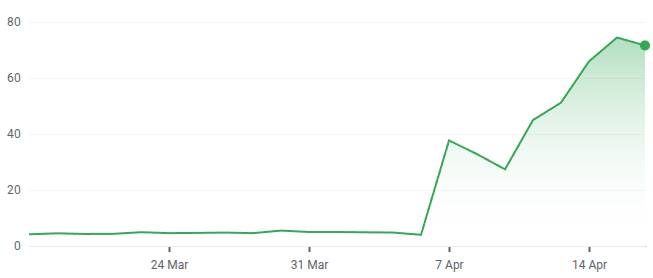In a bold move signaling the evolving landscape of corporate treasury strategies, real estate-focused financial technology firm Janover has made headlines by acquiring 80,567 Solana tokens, totaling approximately $10.5 million. This investment adds to Janover’s already significant Solana holdings, bringing the total to 163,651.7 tokens, now valued at about $21.2 million, inclusive of staking rewards.
Janover’s recent acquisition marks a noteworthy shift as it diversifies its asset portfolio with Solana (SOL), a digital currency that has gained traction among crypto enthusiasts. Each of Janover’s 1.5 million shares is now associated with 0.11 SOL, valued at $14.47, reflecting a substantial increase of 120%. This strategic investment comes on the heels of the company successfully raising around $42 million through a convertible note and warrant sale, with backing from prominent names in the industry, including Pantera Capital and Kraken.
“We plan to start staking the newly acquired SOL immediately to generate additional revenue,” stated the company in its announcement.
The recent leadership change at Janover, with former Kraken executive Joseph Onorati stepping in as chairman and CEO, further emphasizes the company’s commitment to innovating its treasury strategy. While many firms focus their investments primarily on Bitcoin (BTC), Janover’s choice to accumulate Solana sets it apart as an outlier in the corporate crypto landscape.
This growing trend of companies adding digital assets to their balance sheets raises intriguing questions about the future of asset management in a shifting economic landscape. With firms like Strategy (formerly MicroStrategy) famously accumulating Bitcoin, Janover’s focus on Solana may represent a broader diversification strategy as firms seek to modernize their financial methodologies. However, the ongoing debate around such investments continues, particularly as macroeconomic conditions evolve.
Janover’s Strategic Investment in Solana Tokens
Key insights from Janover’s recent acquisition of Solana tokens and its implications for investors and the crypto market.
- Acquisition Details:
- Janover acquired 80,567 Solana tokens for approximately $10.5 million.
- Current total holdings in Solana (SOL) amount to 163,651.7 SOL, valued at about $21.2 million.
- Each of Janover’s 1.5 million shares now contains 0.11 SOL, valued at $14.47—an increase of 120%.
- Investment Strategy:
- Janover plans to begin staking the newly acquired Solana to generate additional revenue.
- The acquisition aligns with Janover’s strategy to enhance its digital asset treasury.
- Capital Raising:
- Janover raised $42 million through a convertible note and warrants sale from notable investors like Pantera Capital and Kraken.
- A team of former Kraken executives is now leading Janover, indicating a strong background in crypto.
- Market Position:
- Janover is among the few companies diversifying into assets beyond Bitcoin, specifically into Solana.
- Bitcoin remains the dominant digital asset held by corporations, with firms like MicroStrategy holding substantial amounts.
- Broader Implications:
- Janover’s move could catalyze other companies to explore altcoins, potentially leading to increased interest and investment in non-Bitcoin cryptocurrencies.
- The strategy to hold digital assets may influence how companies manage inflation risk and diversify their treasuries.
- Changing sentiment around Bitcoin as a “safe haven” asset during economic uncertainty could impact individual investment decisions.
Janover’s Bold Move: A Fresh Angle in the Digital Asset Space
Janover’s recent acquisition of over 80,000 Solana tokens, valued at approximately $10.5 million, signifies a strategic deviation from the predominant trend of Bitcoin accumulation among corporate treasuries. While giants like Strategy (formerly MicroStrategy) and Metaplanet have opted for Bitcoin as a safe-haven asset against inflation, Janover’s choice highlights a competitive edge by diversifying into altcoins, thus differentiating itself in the burgeoning fintech and real estate intersection.
On the upside, Janover stands to gain from an anticipated surge in Solana’s market performance, particularly as they embark on staking these assets to generate revenue. This proactive approach not only supplements their treasury but also positions them favorably for long-term growth. Moreover, with the backing of substantial investments from firms like Pantera Capital and Kraken, Janover possesses a robust financial foundation that can support further innovations and strategic pivots.
However, this route is not without its risks. The volatility inherent in altcoins like Solana may pose challenges that established Bitcoin holders are less likely to face. By venturing into a less conventional asset, Janover places itself at the mercy of market fluctuations that can be drastically unpredictable. In contrast, Bitcoin has achieved a level of trust and recognition, filtering out some of the risk associated with other cryptocurrencies.
This bold maneuver could resonate well with tech-savvy investors who are open to exploring the potential of emerging digital assets. Those eager to witness the evolution of fintech strategies might find Janover’s approach refreshing and insightful. However, more conservative investors, particularly those wary of the ups and downs of altcoins, may perceive this strategy as a gamble, introducing a layer of uncertainty that could influence their investment decisions.
In the competitive landscape of corporate treasury management, Janover’s shift towards digital assets, especially Solana, marks a significant trend that highlights the ongoing shift within the financial ecosystem. As firms continue to test the waters of cryptocurrency, Janover’s journey provides an intriguing case study of the potential benefits and inherent risks involved in diversifying into alternative assets.
















